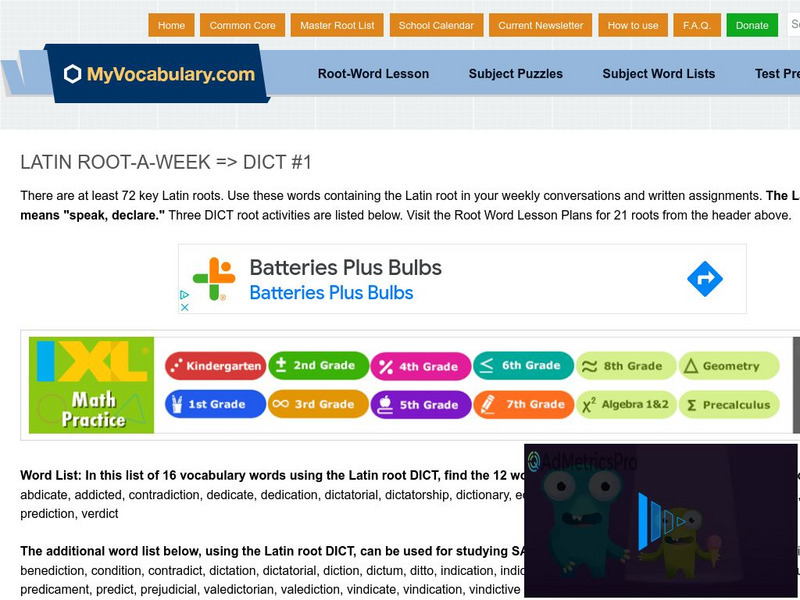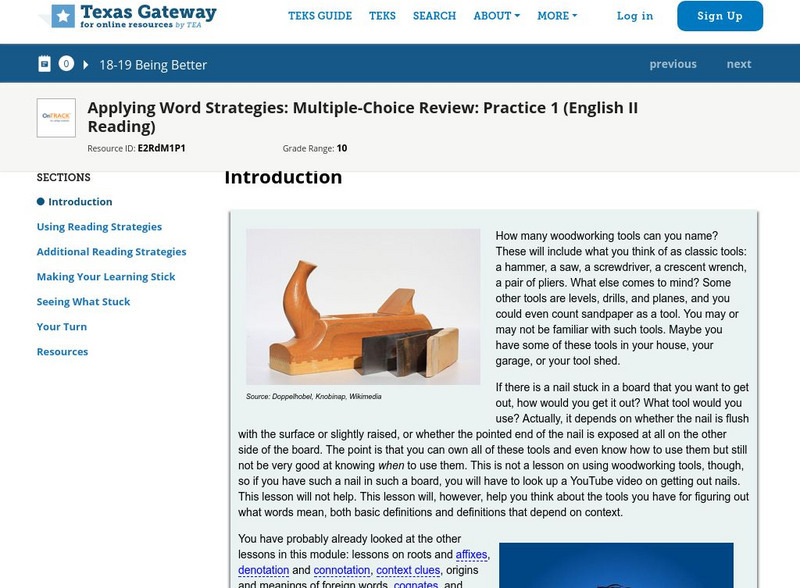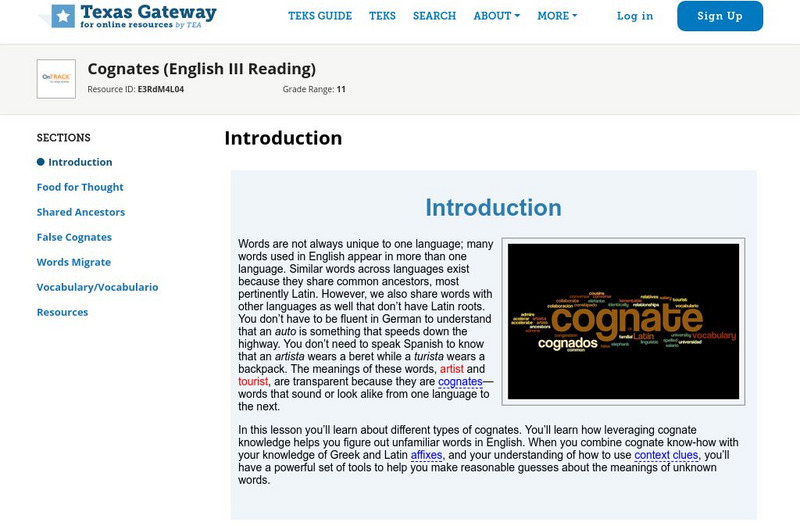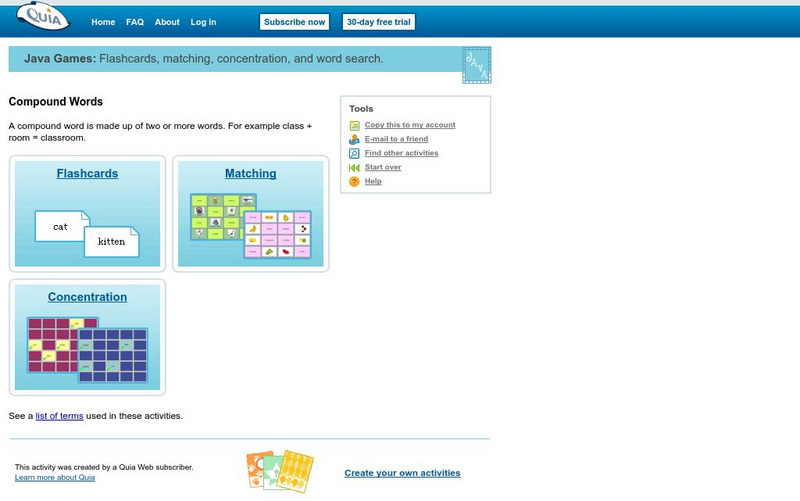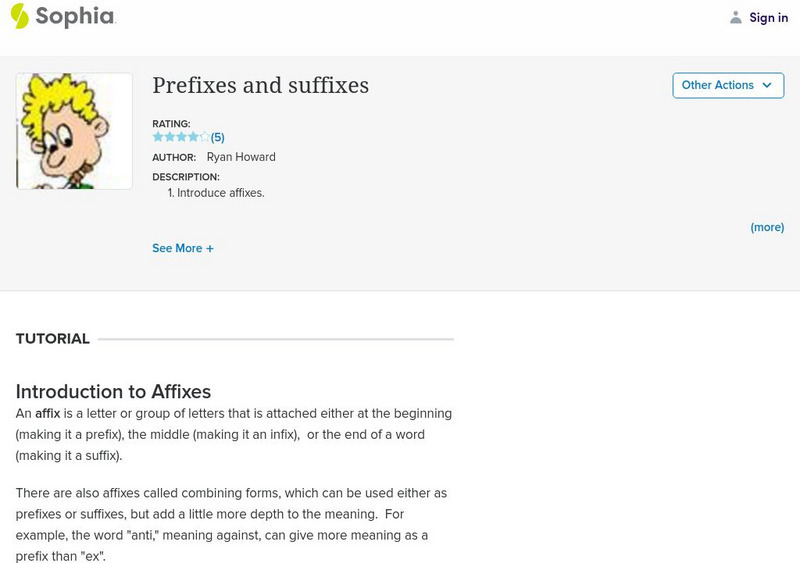PBS
Pbs News Hour Extra: Violent Extremism Across Time and Place: Comparing the Roots
Lesson plan provides the means for students to explore extremist groups. Students will compare and analyze two groups from the past or present to find causes that these groups use to justify hate, violence, and killing. A comparison...
SMART Technologies
Smart: Prefixes, Suffixes, and Root Words
Create words using prefixes, suffixes, and root words. Group the words together as words are created and add them to the word bank. Add your own prefixes, suffixes, and root words to extend the activity.
TES Global
Blendspace: Roots & Affixes
A learning module that includes fifteen links to images, videos, online games, websites, lists and more that teach prefixes, Greek and Latin rooms, and suffixes.
Scholastic
Scholastic: Instructor: Reading Clinic: Strategy Inventory
This lesson plan includes a group of activities that will teach students how to use vocabulary knowledge to help with comprehension of a text. Split into three activities, this lesson plan encourages students to use prior knowledge, word...
Vocabulary University
My vocabulary.com: Latin Root a Week: Dict #1
There are at least 72 key Latin roots. Use these words containing the Latin root in your weekly conversations and written assignments. The Latin root DICT means "speak, declare." Three DICT root activities, a list of 16 words for these...
Texas Education Agency
Texas Gateway: Applying Word Strategies: Multiple Choice Review: Practice 1
Lessons on roots and affixes, denotation and connotation, context clues, origins and meanings of foreign words, cognates, and reference materials help determine word meanings. These lessons told you HOW to use these word discovery tools....
TED Talks
Ted: Ted Ed: The Hidden Meanings of Yin and Yang
The yin-yang symbol holds its roots in Taoism/Daoism, a Chinese religion and philosophy. John Bellaimey explains why we all contain the spirit of yin and of yang- and how we can achieve a balance of both in our lives. [4:09]
Texas Education Agency
Texas Gateway: Applying Word Study Strategies (English I Reading)
Apply previous lessons, (1) Linguistic Roots and Affixes, (2) Denotation and Connotation, (3) Origins and Meanings of Foreign Words, (4) Cognates, and (5) Reference Materials, to improve fluency and comprehension.
Fun Brain
Fun Brain: Rooting Out Words
Three categories of words and four skill levels challenge players to identify the roots for the names of months, for numbers and numerical terms, and for a range of other words based on commonly used roots.
SMART Technologies
Smart: Prefix and Suffix Mix Up
In this activity provided by SMART, students will learn the meaning of common prefixes and suffixes, practice combining root words with prefixes and suffixes, and recognize changes in words after combining prefixes and suffixes.
Capital Community College Foundation
Guide to Grammar and Writing: Building a Better Vocabulary
This is an index of vocabulary-building information and quizzes, including a list of roots, prefixes, and suffixes with their meanings. It offers 365 SAT and GRE level vocabulary words, definitions, and sample sentences. The quizzes...
Texas Education Agency
Texas Gateway: Cognates (English Iii Reading)
In this lesson you'll learn about different types of cognates, words that sound or look alike from one language to the next. You'll learn how leveraging cognate knowledge helps you figure out unfamiliar words in English. When you combine...
ClassFlow
Class Flow: That's Greek
[Free Registration/Login Required] Did you know that at least half of the words in the English language are derived from Greek and Latin roots? Students use these roots to grasp meaning of words before looking them up in the dictionary....
Quia
Quia: Compound Words
This site offers three focusing on compound words: Flashcards, one side with base word, other side with a word to form compound: Matching, match pairs of words to form compound words; and Concentration, matching pairs of words to form...
Sophia Learning
Sophia: Prefixes
This lesson focuses on prefixes; it defines prefix, and discusses the purpose of prefixes and how they can change the base word. It also provides a list of common prefixes with their meanings.
Houghton Mifflin Harcourt
Holt, Rinehart and Winston: Theme: The Story's Meaning and Roots [Pdf]
A PDF worksheet that provides five important questions to help you analyze theme. RL.9-10.2 and 11-12 Analyzing Theme.
AdLit
Ad lit.org: Classroom Strategies: Word Hunts
Word Hunts are used to enhance students' vocabulary growth. Teachers ask students to look for words and patterns in reading materials based upon selected features. Word Hunts focus on the structure and meaning of words by turning...
TED Talks
Ted: Ted Ed: Mysteries of Vernacular: Bewilder
The history of the word bewilder is more straightforward than you might think. Roots can be traced back to the Old English words wilde (undomesticated) and deor (untamed animals), eventually combined into the word wilderness. Jessica...
Sophia Learning
Sophia: Prefixes and Suffixes
This tutorial begins with a YouTube video rapping about affixes including roots, prefixes, and suffixes. There are two slide shows including one about prefixes and one about suffixes; each includes definition, how it functions, and a...
SMART Technologies
Smart: Context Clues With Vocabulary
This lesson focuses on using context clues within a sentences to determine the meaning of an unknown word. Additional skills of prefixes and root words are included. Answer pages are provided for each practice activity.
Vocabulary.com
Latin Root "Sub" Words
This site contains a list of 10 words that contain "sub", a prefix that means "under" or "below", in them. Teachers can digitally assign this list to their students to reinforce the spellings, pronunciations, and meanings of these words.
University of South Florida
Fcat Express: Contextual Clues
Strategies to help students recognize the meaning of words through contextual clues provided by a standardized test preparation site intended for fourth grade. Includes strategies such as C(2)QU (See Two Cue You), PReP (Prereading Plan),...
University of California
Regents of the University of California: Using the Cognates Strategy
This strategy guide introduces an approach for making students aware of cognates (words that have a similar spelling, pronunciation, and meaning across languages) in content-area texts. This guide includes an introductory section about...
AdLit
Ad lit.org: Key Literacy Component: Morphology
Morphology describes how words are formed from building blocks called morphemes, the smallest unit of meaning in a word. Students who don't understand this structure have trouble recognizing, understanding, and spelling words. Find out...





